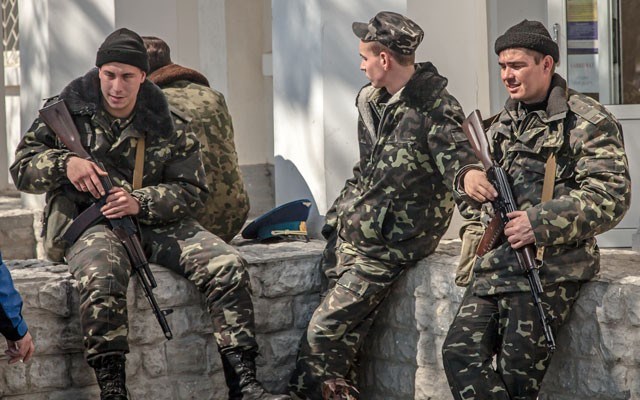Crimea is going to be part of Russia, and there is nothing anybody else can do about it. The petty sanctions that the United States and the European Union are currently imposing have been discounted in advance by Moscow, and even much more serious sanctions would not move it to reconsider its actions. But Vladimir Putin still has to decide what he does next.
One option, of course, is to do nothing more. He has his little local triumph in Crimea, which is of considerable emotional value to most Russians, and he has erased the loss of face he suffered when he mishandled the crisis in Kiev so badly. If he just stops now, those sanctions will be quietly removed in a year or two, and it will be business as usual between Moscow and the West.
If it's that easy to get past the present difficulties in Moscow's relations with the U.S. and the E.U., why would Putin consider doing anything else? Because he may genuinely believe that he is the victim of a Western political offensive in Eastern Europe.
Paranoids sometimes have real enemies. NATO's behaviour since the collapse of the Soviet Union, viewed from Moscow, has been treacherous and aggressive, and it doesn't require a huge leap of the imagination to see the European Union's recent policy in Ukraine as a continuation of that policy.
After non-violent revolutions swept the Communist regimes of Eastern Europe from power in 1989, the Soviet president, Mikhail Gorbachev, made a historic deal with U.S. President George H.W. Bush. It was unquestionably the most important diplomatic agreement of the late 20th century.
Mikhail Gorbachev agreed to bring all the Soviet garrisons home from the former satellites, and even to allow the reunification of Germany — a very difficult concession when the generation of Russians that had suffered so greatly at Germany's hands was still alive.
In return, the elder President Bush promised that the countries that had previously served the Soviet Union as a buffer zone between it and Germany — Poland, Czechoslovakia, Hungary, Romania and Bulgaria — would not be swept up into an expanding NATO. They would be free, but NATO's tanks and aircraft would not move a thousand kilometres (500 miles) closer to Moscow.
It was a wise deal between two men who understood the burden of history, but they were both gone from power by the end of 1992 — and Gorbachev had neglected to get the promise written into a binding treaty. So it was broken, and ALL those countries were in NATO by 2004 — together with three other countries, Estonia, Latvia and Lithuania, that had actually been part of the Soviet Union itself.
NATO's eastern frontier is now only 120 km (75 miles) from Russia's second city, St. Petersburg. The Russians were burned again when NATO encouraged the secession of Kosovo from Serbia (a handy precedent for Crimea's secession from Ukraine), and once more when NATO got Moscow's agreement to an emergency military intervention in Libya to stop a massacre, and expanded it into a campaign to overthrow the ruler, Muammar Gadhafi.
To Russian eyes, what has been happening in Ukraine is more of the same. If Putin believes that, then he thinks he is already in a new Cold War, and he might as well go ahead and improve his position for the coming struggle as much as possible. Specifically, he should grab as much of Ukraine as he can, because otherwise the western part will be turned into a NATO base to be used against him.
Crimea is irrelevant in this context: the Russian naval bases there are nostalgic relics from another era, of no real strategic value in the 21st century. What Putin does need, if another Cold War is coming, is control of the parts of Ukraine where Russian speakers are a majority or nearly so: not just the east, but also the Black Sea coast. But he shouldn't occupy western Ukraine, because he would face a prolonged guerilla war if he did.
This is all extremely paranoid thinking, and perhaps it never passes through Putin's mind at all. But if it does, then he knows that he has just over two months to make up his mind.
If Putin allows Ukraine to hold the scheduled national election on May 25, then even the preposterous pretext he has been using for the past month to justify his meddling — that he is intervening to protect Russian-speakers from a "fascist junta" in Kiev — will vanish. So we should know fairly soon which way he is going to jump.
My money says that Putin will stop with Crimea, because he's not that paranoid, and because he understands how weak Russia is economically and how quickly it would lose a new Cold War. He has already saved his face; why run further risks? But I have been wrong in the past, once or twice.
Gwynne Dyer is an independent journalist whose articles are published in 45 countries.




